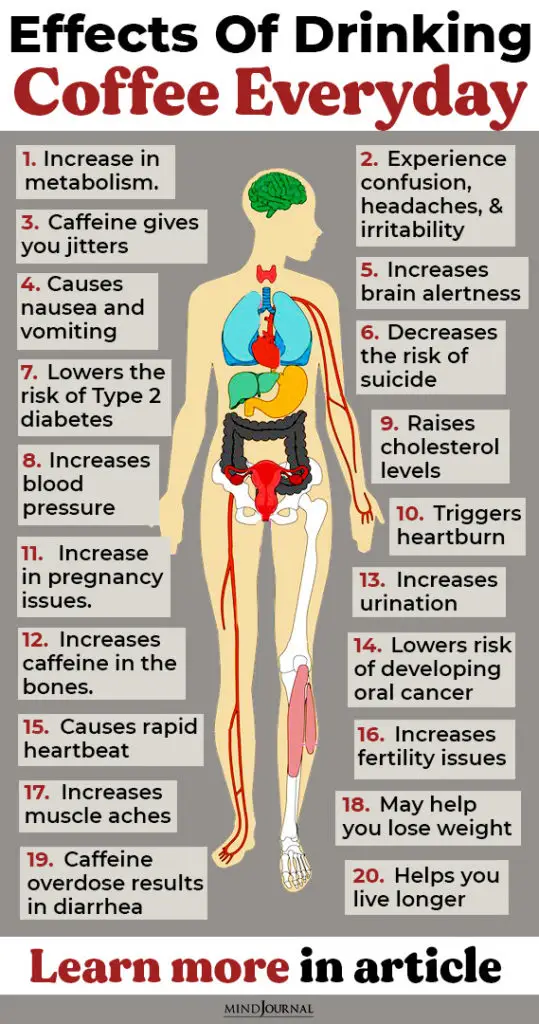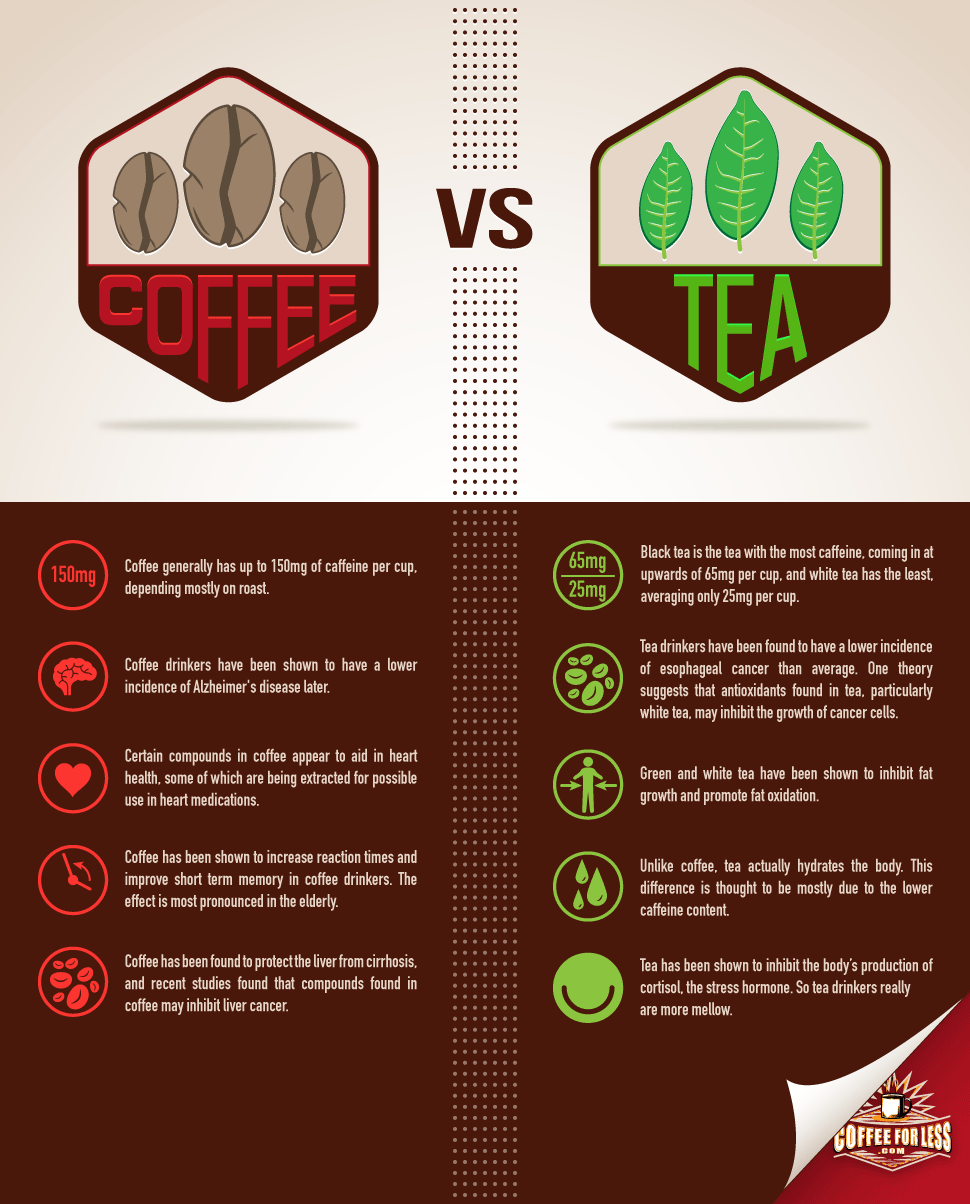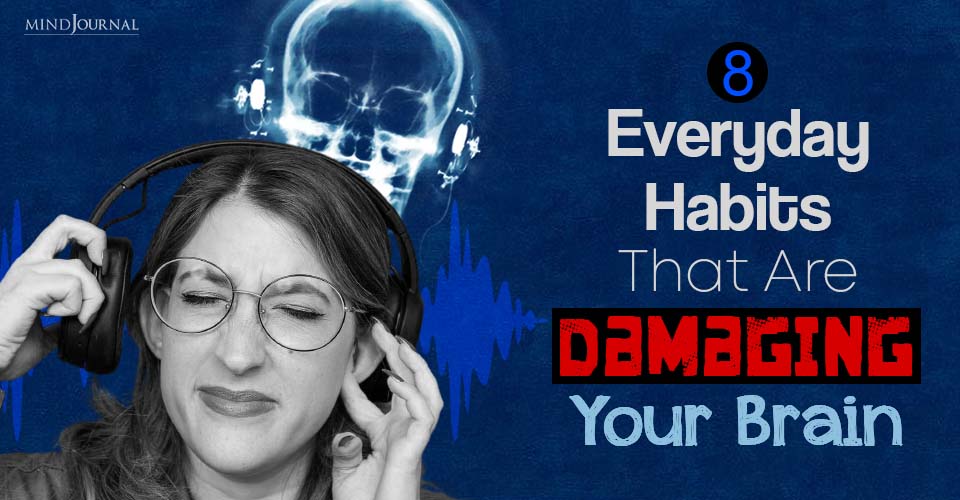Do you drink coffee everyday? does it rejuvenate and energize you? Are you a sucker for the hot piping cup of Joe? Is coffee your middle name for breakfast? Do you crave for coffee at the start of the day?
For many of us, kick-starting a day is incomplete without a cup of black espresso! The heat of the coffee helps give you comfort and warmth and is a treat for coffee aficionados the world over. Coffee originally was grown in Africa and South America.
The beans now are crushed and ground in the United States to cater to a growing clientele in North America. America does really run on coffee! You will be surprised to know that 54% of Americans over the age of 18 drink an average of 3.1 (8 oz) cups of coffee per day.
With many varieties donning the coffee parlour shelves, here are a few things coffee lovers can take heart from:

1. Increase in metabolism.
This is good news for those of you that follow a good workout routine. With an exercise regimen in place, you can start off with the caffeine from the coffee and naturally boost the energy levels that help rev up your health and spirits. In a study conducted by the Journal of Applied Physiology found that endurance athletes who had a cup of coffee after exercise had a 66 per cent increase in muscle glycogen that helped replace the deficient energy levels.
In a study recently logged in the National Library of Medicine, researchers observed that – a single-dose oral administration of 100 mg caffeine increased the resting metabolic rate of both lean and postobese human volunteers by 3-4% (p less than 0.02) over 150 min and improved the defective diet-induced thermogenesis observed in the postobese subjects.
Read A Glass Of Red Wine Can Replace An Hour Of Exercising According To New Study
2. Experience confusion, headaches, and irritability.
No doubt, a cup of strong coffee gives you a mental boost and helps a lot especially when you are busy with important work. However, if you continue to do this every day, you will soon be addicted to caffeine. Because coffee normally binds to the adenosine receptors in the brain. Adenosine is what builds up sleep pressure and creates tired sensation and with excess coffee consumption, our body tends to create more adenosine receptors, which then no longer are bound by the caffeine in coffee.
As a result, you will crave for more coffee just to counter the withdrawal symptoms including anger, irritation, low energy, confusion, headache, mental exhaustion. According to the American Heart Association, “Caffeine-habituated individuals can experience ‘caffeine withdrawal’ 12–24 hours after the last dose of caffeine. It resolves within 24–48 hours. The most prominent symptom is a headache.
3. Caffeine gives you jitters.
If you are not used to it, caffeine can affect the nervous system and give you jitters. People with an anxiety disorder and sleep problems having coffee regularly can experience jitters and may worsen the health. Excess coffee consumption can negatively affect your daily routine. So, keep a check on coffee intake to prevent the tolerance buildup.
Read: How to Stop Addiction to Drugs, Alcohol, and Cigarettes
4. Excess caffeine causes nausea and vomiting.
There are various acids found in coffee that contribute to the taste of your brew. The acidity in coffee, especially when you drink coffee on an empty stomach every day, may irritate your stomach lining, and cause feelings of nausea and vomiting.
5. Increase brain alertness.
Caffeine in coffee has a positive effect on mental alertness, attention, mood and concentration. What’s more surprising is the ability of coffee to enhance memory retention. Coffee is able to increase mood and reaction times in humans with an increase in memory and alertness too.
According to a study published in Nature Neuroscience, Caffeine enhanced performance 24 hours after administration. Based on findings researchers concluded that caffeine enhanced consolidation of long-term memories in humans. That said, excessive coffee consumption is not necessarily better. You may not always experience an increase in productivity.
As per one study published in the Experimental and Clinical Psychopharmacology journal, one serving of coffee drastically improves focus and mental stamina ten minutes after consumption.
According to cardiologist Dr. Steven Reisman, director of the New York Cardiac Diagnostic Center, caffeine in coffee increases your brain activity by blocking adenosine. He explained to The List that caffeine also increases the neurotransmitters such as dopamine and norepinephrine, which can reduce tiredness and increase mental alertness. Thus, coffee drinkers have a good level of happy hormones in their blood system.
If you drink 3-5 cups of coffee everyday, you decrease the risk of depression, Alzheimer’s disease or even dementia. Other studies have shown how drinking coffee daily can lower the risk of developing Parkinson’s disease – a neurodegenerative disorder to about 32- 60 per cent.
Read: 6 Reasons You May Be Gaining Weight Unintentionally: The Science Behind Obesity
6. Decrease the risk of suicide
The Harvard Public School of Health found that adults who had two to four cups of caffeinated coffee everyday had 50 per cent lower risk of suicide to those who drank decaf or no coffee at all.
Coffee also had high levels of antioxidants and vitamins B1, B2, B3 and B5. With good doses of manganese and potassium, coffee can be a great lifesaver!
Another study, published in the World Journal of Biological Psychiatry, concluded that people who consumed four or more cups of coffee daily were less likely to commit suicide.
Read 3 Helpful Healthy Coffee Recipes That Boost Your Run
7. Lower the risk of Type 2 diabetes.
Coffee users who started drinking coffee from one cup to more than that over a period of 5 years had 11 per cent lower risk of developing Type 2 diabetes, which is linked to higher risks of colorectal, liver, breast and endometrial cancer incidence and/or mortality, according to the The American Cancer Society
Those users, who decreased their coffee consumption by more than a cup in a day, increased the risk of Type 2 diabetes by 17 per cent.
Coffee is often labelled as black gold. The coffee beans have a lot of power punched in it! The benefits of drinking coffee are truly time tested. With more and Americans taking to the drink in recent years, coffee connoisseurs have much to look up to.

8. Increase blood pressure
Well, nothing to worry! The effect may be short and temporary and there are no long term effects. There is no harmful influence on the blood vessels, which is highly likely to happen with many other major dietary factors.
Read: 12 Health Benefits of Drinking Water
9. Raise cholesterol levels
The way you brew your coffee matters a lot, especially if you’re worried about cholesterol. Those who prefer French press, a percolator, or espresso, please know that your coffee consists of a significantly higher amount of cafestol than if you use paper filtered or instant coffee. Expresso causes the body’s low-density lipoprotein (LDL) cholesterol levels to rise, which increases the chance of heart attacks and premature death. But filtered coffee is devoid of cholesterol-increasing oils, called terpenes.
In a report released by the European Society of Cardiology, those who applied a filter before taking coffee drastically decreased their likelihood of experiencing cardiac incidences, including heart attack-related deaths.
Read: The Effects Of Negative Emotions On Our Health
10. Trigger heartburn.
Caffeinated drinks and products cause acidity and heartburn. When you drink caffeine, the muscle at the end of the oesophagus relaxes and allows food and stomach acid to come back up, a condition called acid reflux. That causes a burning feeling in your chest, known as heartburn. You can avoid this by using coffee beans that have undergone a steam treatment prior to roasting, which makes your coffee more stomach-friendly.
11. Increase pregnancy issues.
If you are a coffee lover, but currently pregnant then you need to sacrifice your coffee for a few months. Rob van Dam, an epidemiologist at Harvard University said in an interview with Today that caffeine intake may be detrimental to the fetus because the fetus can’t metabolize caffeine or make it dissolve from the bloodstream. It may lead to miscarriage and developmental issues in the newborn.
So, pregnant women consuming more than recomneded 200 mg of caffeine per day, can lower the nutrition for the fetus as well as negatively impact its health. Even though there is no conclusive evidence, it is best for pregnant women to limit their coffee intake.
12. Increase caffeine in the bones.
The all-natural caffeine in coffee boosts physical performance, especially during aerobic or endurance exercises. You will feel a decrease in fatigue and pain. However, excess coffee consumption may increase the risk of osteoporosis because caffeine prevents calcium absorption in the bones.
According to Witherspoon, the recommended caffeine intake amount is 2-6 milligrams of caffeine per kilogram of body weight (1kg = 2.2lbs), which is 1 to 4 (8 oz.) cups of regular brewed coffee for someone weighing 150 pounds.
Coffee can benefit you whether you are doing prolonged and short-term workouts, but with caffeine addiction – as you get older, your bones may break easily.
13. Increase urination.
More the coffee consumption, more the urge to urinate. Caffeine has a diuretic effect, and excess consumption increases the blood flow to the kidneys and at the same time reduces the absorption of water and sodium. Also, caffeine irritates the tissues of the bladder and potentially
cause an involuntary bladder contraction. Excess caffeine not only causes bladder instability but worsens the health of those already experiencing bladder problems.
14. Lower risk of developing oral cancer.
Coffee offers you antioxidants and those drink black coffee (four or more 8-ounce cups per day) can actually decrease their chances of developing oral and throat cancer. A U.S based study revealed adults who drink more than four cups of caffeinated coffee every day had a 49% lower relative risk of dying from mouth and throat cancer than those who reported drinking no or occasional caffeinated coffee.
15. Cause rapid heartbeat.
Excess caffeine increases blood pressure, an effect attributed to rising in adrenaline or temporary block on the hormones that naturally widen arteries causing heart palpitations. For people with irregular heart rhythm, caffeine makes your heart work harder. Caffeine overdose can also result in death due to convulsions or irregular heartbeat.
16. Increase fertility issues.
Some women who consume more than the recommended amount of coffee per day experienced difficulties getting pregnant. People with fatigue show high consumption of caffeine. Fatigue could signal an underlying disease or health condition that does harm fertility, like endometriosis or even depression. It’s better to opt for decaffeinated or half-caffeinated coffee,
17. Increase muscle aches.
As discussed earlier consuming caffeine in large amounts may interfere with absorption and metabolism of calcium, which leads to thinning of bone and causes muscles to twitch. Caffeine prevents receptors in the brain from dilating blood vessels that leads to pain in different body parts. Hence, people experiencing caffeine withdrawal, have increased muscle aches. Achy muscle makes it hard for protein to break down – which can lead to further muscle pain and weakness, as per study published in “The American Journal of Clinical Nutrition” in 2006.
18. May help you lose weight.
According to a 2020 study by Harvard public health researchers, having four cups of caffeinated coffee per day led to a 4% decrease in body fat. This is because coffee increases the metabolic rate, which increases the number of calories burned. As per Dr Steven Reisman, coffee improves your physical performance in aerobic exercise and helps your body absorb and burn fatty acids in the bloodstream.
However, if you solely depend on excess coffee consumption for weight loss, you may have to face negative health consequences. Besides coffee, you must focus on eating a balanced diet, exercising, and maintaining a healthy weight. Also, remember that having coffee with cream and sugar, adds to fat and calories, which can contribute to weight gain.
19. Caffeine overdose results in diarrhea.
Caffeine itself also seems to stimulate bowel movements by increasing peristalsis, the contractions that cause movement of food through your digestive tract. So, a large dose of coffee leads to loose stools or even diarrhea in some people. Also, too much caffeine can interfere with sleep, trigger migraines, which in turn aggravate digestive problems.
20. Help you live longer.
Do you know that drinking coffee every day means you are 15% more likely to live longer? An epidemiological analysis published in Circulation 2015 has provided evidence in this regard.
According to Beth Witherspoon, registered dietitian consultant for Community Coffee Company, a daily intake of 3-5 cups of coffee may be linked to decreased mortality from all causes, reduced risk of developing liver cirrhosis, and certain cancers, including liver and endometrium. Researchers have found how older adults who consumed four or more cups of coffee per day had 20 per cent lower risk of developing malignant skin cancer.
So, coffee is also called a “miracle drug” that keep diseases away. However, please note that health experts recommend black caffeinated coffee to make most of the antioxidants and better reap health benefits.
With high levels of flavonoids, lignans, polyphenols, and phytochemicals, coffee can increase energy expenditure, inhibit cellular damage, regulate genes involved in DNA repair, have anti-inflammatory properties and/or inhibit metastasis, among other activities, as explained by Susan Gapstur, PhD, and Marjorie McCullough, ScD to The American Cancer Society in an interview.
Now that you’re well aware of all the pros and cons of drinking coffee everyday, you must be wondering, how much coffee you should be drinking everyday?
Safe daily value
Well, based on the vast literature available on coffee consumption and health effects, the safe daily value as recommended by most medical professionals is 400 milligrams (mg) for healthy adults. Federal dietary guidelines equate this to roughly three to five eight-ounce cups of coffee per day. You can derive the following nutrients from a single serving-
- Riboflavin (vitamin B2): 11% of the Reference Daily Intake (RDI).
- Pantothenic acid (vitamin B5): 6% of the RDI.
- Manganese and potassium: 3% of the RDI.
- Magnesium and niacin (vitamin B3): 2% of the RDI.
If you want to ensure best health outcomes, make sure to use filter when brewing coffee. And if you have a medical condition and want to drink coffee everyday, it’s better to discuss with your doctor.










Leave a Reply
You must be logged in to post a comment.